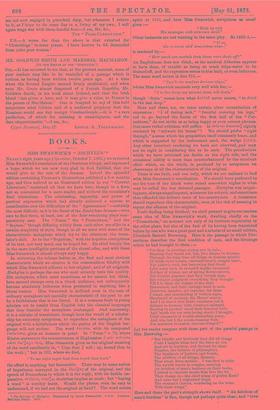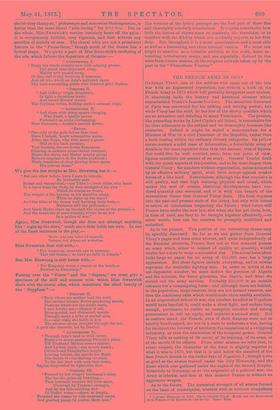BOOKS.
MISS SWANWICK'S .XSCHYLUS."
NEARLY eight years ago (Spectator, October 7, 1865,) we reviewed Miss Swanwick's translation of the Oresteian trilogy, and expressed a hope, which we are now very glad to find fulfilled, that she would give us the rest of the dramas. Indeed the splendid edition containing Flaxman's illustrations published a few months ago, and then noticed as an illustrated edition in our "Current Literature," contained all that we have here, though in a form not so convenient for a mere reader, and without the translator's final alterations. The scholarship, ingenuity, and power of poetical expression which had already achieved a success so considerable over the difficulties of the "Agamemnon "—certainly the most difficult, as it is the finest of the 2Eschylean dramas—were sure to find three, at least, out of the four remaining plays com- paratively easy. The "Persm," the "Prometheus," and the " Septem," though differing widely from each other, are alike in a certain simplicity of style, though in all we meet with some of the characteristic tnetaphors which try to the uttermost the trans- lator's skill. As to the "Supplices," with the hopeless corruptions of its text, not very much can be hoped for. Its chief beauty lies in the more intelligible portions of the choral odes, and with these Miss Swanwick is almost always very happy.
In reviewing the volume before us, the first and most obvious characteristic which we observe is the conscientious fidelity with which Miss Swanwick adheres to her original; and of all originals, Esebylus is perhaps the one who most severely tests this quality. His metaphors, which must sometimes, as we cannot but think, have seemed strange even to a Greek audience, not unfrequently become absolutely ludicrous when presented in anything like a literal version. Miss Swanwick is inclined even in the case of ordinary metaphors not specially characteristic of the poet to err by a faithfulness that is too literal. It is a common fault in young scholars set to render from English into the classical languages that they transfer the metaphors unchanged. And conversely, it is a mistake of translators, though here the result of a scholar- ship too anxiously scrupulous, to reproduce the metaphors of the original with a faithfulness which the genius of the English lan- guage will not endure. The word ib,6cr6w, with its compound iszsroanicrctfo, gives an instance in point. In "Prom." v. 73, where Kratos answers to the remonstrances of Hephaestus 21 Ihiv zEXE60'w ;saw./ Ordialys Irp6c, Miss Swanwick gives us the original meaning of the word excellently in, "Urge thee I will ; ay, hound thee to the work ; " but in 392, where we find,
"To me right eager hest thou bayed that word,"
the effect is anything but favourable. There may be some notion of impatience conveyed in the Mal(1,;a; of the original, and the speech of Prometheus to which it is the reply, with its double im- perative, ari?aou, zo,ctio), doubtless implies as much ; but "baying a word" is terribly harsh. Would the phrase even be easy to understand, if we had not the original at hand? The word occurs • The Dramas of .X.sehylus. Translated by Anna Swanwick. 2 vols. London: Bell and Daldy. 1873.
again at 1011, and here Miss Swanwick, scrupulous as Inuit gives :—
" Hath he told His messages with utterance shrill."
Other instances are not wanting in the same play. So 1483-4,—
11on
dica ii Oraavi arr krarrX>iarei a.tivon:"
is rendered by,—
" How much can mortals from these woes drain off?"
An Englishman does not think, as the nautical Athenian appears to have done, of trouble as being so much bilge-water to be- drained off, and the expression seems to him bald, or even ludicrous.
The same word occurs in line 375,-=
4- 'Er:, 11 .74P, srapsiiacer icy7Xnow
where Miss Swanwick succeeds very well with her,—
" I to the dregs my present doom will drain," though ' drain ' means here what civrXE7Y never means, "to drink -
to the last drop."
Here and there, too, we trace certain other eccentricities of expression ; "I of daring lack," "forceful covering his legs,' not to go beyond the limits of the first half of the "Pro- metheus," do not strike us as being happy or even correct phrases..
One more verbal criticism will suffice. Is ctripvans bite,u4reg rightly
rendered by "athwart his breast "? We should prefer "right through," a sense which the preposition itself commonly bears, and which is suggested by the instrument used, the wedge (qCp).- Any other incorrect rendering we have not observed, „and may not be right in considering this to be such. The peculiarities
which we have criticised are faults on the right side, and the-
occasional oddity is more than counterbalanced by the excellent effect which, on the whole, is produced by so scrupulous am observance of all the characteristics of the original.
There is one fault, and one only, which we are inclined to find with Miss Swanwick's versification. We should have preferred to- see the tone of the blank verse raised somewhat higher in what may be called the less elevated passages. lEschylus was magni- loquent, always magniloquent, whatever his subject, and sometimes thus offended the delicate taste of his countrymen. A translators
should reproduce this characteristic, even at the risk of seeming to-
repeat the offences of the original.
Fault-finding being finished, we shall proceed to give our readers
some idea of Miss Swanwick's work, dwelling chiefly on the "Prometheus," on account not only of its intrinsic superiority to- the other playa, but also of the fact of its having been translate& before by one who was a great poet and a scholar of no small calibre, Elizabeth Barrett Browning. Here is the passage in which Pro- metheus describes the first condition of men, and the blessings which he had brought to them :—
" For they, in foretime, seeing saw in vain ;
Hearing they heard not, but, like shapes in dreams, Through the long time all things at random mired ; Of brick-wove houses, sunward-turn'd, nought knew, Nor joiner's craft, but burrowing they dwelt Like puny ants, in cagern'd depths unsunned. Neither of winter, nor of spring flower-strewn, Nor fruitful summer, had they certain sign, But-without judgment everything they wrought Till I to them the risings of the stars Discovered, and their settings hard to scan.
Moreover, number, art supreme, for them I found, and marshalling of written signs, Handmaid of memory, the Muses' source.
And I in traces first brute creatures yok'd, Subject to harness, with vicarious strength Bearing in mortals' stead their heaviest toils. And 'neath the car rein-loving steeds I brought, Chief ornament of wealth-abounding pomp.
And who but I the ocean-roaming wain For mariners invented, canvass-winged?"
Let the reader compare with these part of the parallel passage in Mrs. Browning :-
"But blindly and lawlessly they did all things
Until I taught them how the stars do rise And set in mystery, and devised for them Number, the inducer of philosophies, The Synthesis of Letters, and beside, The artificer of all things, Memory, That sweet Muse-mother. I was first to yoke The servile beasts in couples, carrying An heirdom of man's burdens on their backs.
I joined to chariots steeds that love the bit They champ at—the chief pomp of golden Ease!
And none but I originated ships, The seaman's chariot, wandering on the brine With linen wings."
Here and there the poet's strength shows itself. "An heirdom of
man's burdens" is fine, though not perhaps quite clear; and "love
the bit they champ at," picturesque and somewhat Shakespearian, is better than the more literal "rein-loving" for pim;viou;. But on the whole, Miss Swanwick's version certainly bears off the palm ; it is scrupulously faithful; very vigorous, and that without any sacrifice of melody or ease. The choral odes are not a prominent feature in the "Prometheus," though much of the drama has a lyrical shape. We quote a part of Miss Swanwick's rendering of the ode which follows the departure of °mune :— " ANTISTROPRE L
"Rings the whole country now with echoing groans.
The grand time-honoured sway, Mighty now passed away, Of thee and of thy brethren it bemoans.
And all who dwell on Asia's hallowed shore Thy loud-resounding griefs with kindred grief deplore.
"STROPHE II.
"And Cotchis' virgin daughters, In fight a dauntless train; And round Mmotis' waters The Scythian tribes, holding earth's outmost reign.
" ANTISTROPHE U.
"And those with sharp spears clanging Who dwell, a hostile power, Fortreas'd on rocks o'erhanging, Near Caucasos,—Arabia's martial flower.
"EPODE.
a‘ One only of the gods before thus bent Have I beheld, 'neath adamantine pains. Atlas, the Titan, who with many a groan Still on his back sustains, Vast burthen, the revolving firmament. Chiming in cadence ocean-waves resound; Moans the abyss, and Hades' murky gloom Bellows responsive in the depth profound ; While fountains of clear-flowing rivers moan His piteous doom."
We give the last strophe as Mrs. Browning has it :— " But one other before, have I seen to remain, By invincible pain Bound and vanquished,—one Titan 1—'twas Atlas, who bears In a curse from the Gods, by that strength of his own Which he evermore wears, The weight of the heaven on his shoulder alone, While he sighs up the stars !
And the tides of the Ocean wail bursting their bars,— Murmurs still the profound,— And black Hades roars up through the chasm of the ground,—
And the fountains of pure-running rivers moan low In a pathos of woe."
Again, Miss Swanwick, though she does not attempt anything like "sighs up the stars," much more than holds her own. In one of the finest sentences in the play,—
"E,Ef,rs wen ToiPro e•;;" Tuperva Nacrnreec, TO4 faOlel (4;1 TIVIIAYOSI,
Miss Swanwick does well with,— " For, someway, cleaveth aye to tyranny This fell disease ; to have no faith in friends."
at Mrs. Browning is still better with,— " For Kingship wears a cancer at the heart,-- Distrust in friendship."
Passing over the " Persm" and the " Septem," we must give a specimen of the skill and success with which Miss Swanwick deals with the choral odes, which constitute the chief beauty of the " Supplices "
"STROPHE IL
"Back where my mother trod the wold, Her ancient haunts, flower-gendering meads, Pastures where yet the heifer feeds, I now betake me,—whence of old, Brize-goaded, and distracted, speeds Through many a tribe of mortal men, lo ;—and while she holds in ken The adverse shore, straight through the sea, A path she cleaveth, led by Destiny.
" ANTISTROPHE U.
"Through Asia's land in wild career. Right o'er sheep-pasturing Phrygia's plain, Till Teuthras' Mysian towers appear, And Lydian valos,—she &ours amain ; Cilicia's and Pamphylia's height Leaving behind, she speeds her flight O'er banks of ever-flowing streams, To the fair land with corn that teems, Region deep-soiled to Aphrodite dear.
" STROPHE DI.
"Pierced by her winged herdsman's sting, The lea she gains all fostering,—
That heavenly meadow fed from snow, O'erswept by Typhon's strength, And by the bale-averting flow Of Neilos' water ;—there, at length, Frenzied she comes by toils unseemly spent, And goading pangs by jealous Hera sent." The versions of the lyrical passages are the best part of these fine and thoroughly scholarly translations. It is quite remarkable how little the fetters of rhyme seem to constrain the translator, or to interfere with the fidelity which she evidently regards as her first duty. But throughout it is a most conscientious and a most able as well as a fascinating and often musical version. We must not forget to mention, as a valuable addition to the work, some in- teresting introductory essays, and one especially, derived in the main from human sources, on the religious attitude taken up by the poet in the "Prometheus Vinctus."



































 Previous page
Previous page